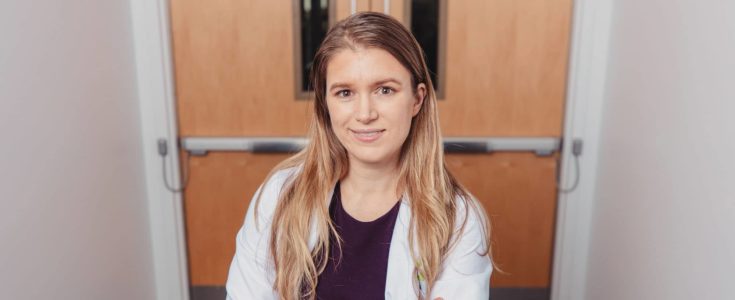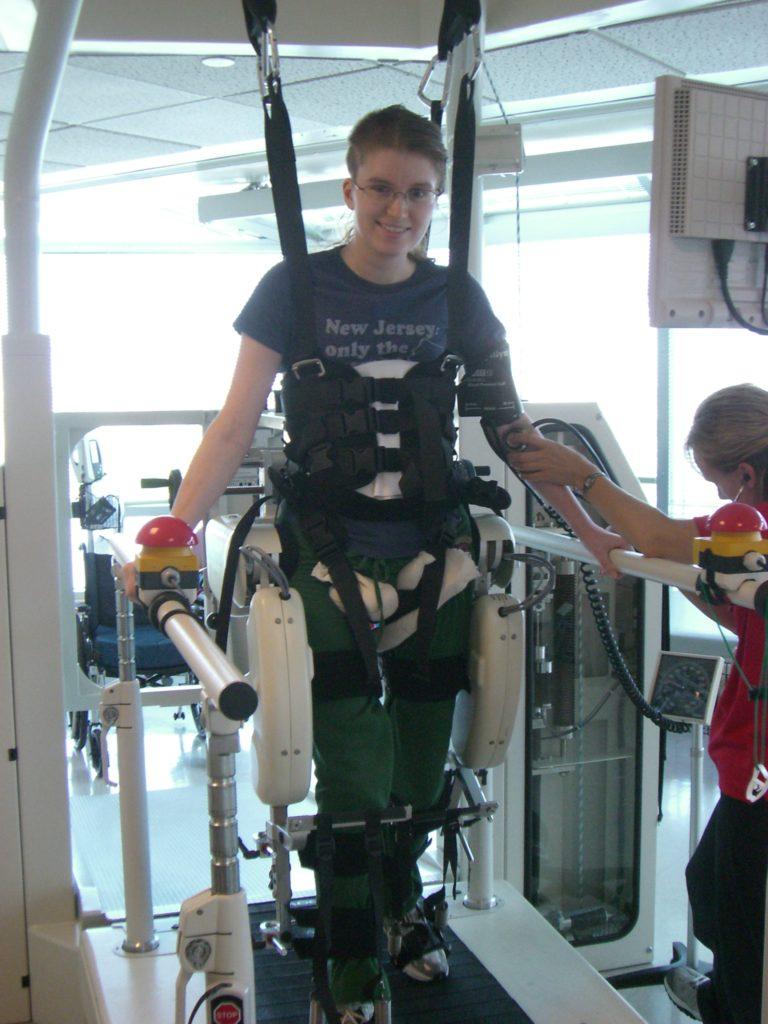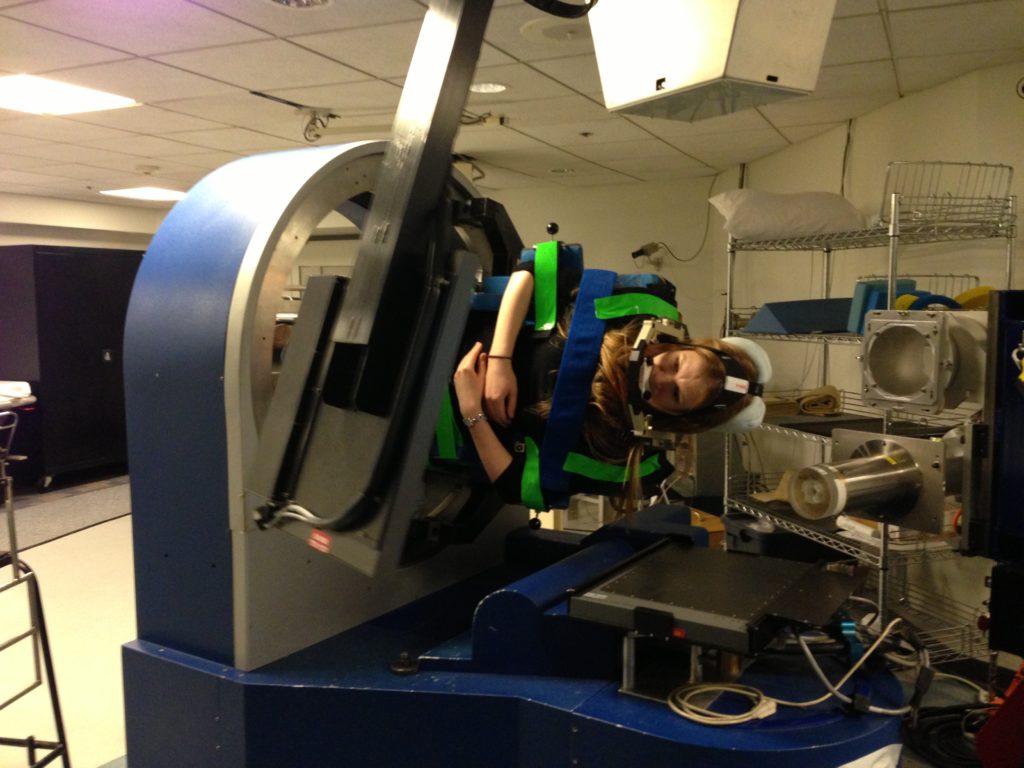
Ivy Blog
Me, Myself, and the Meningioma
- August 11, 2020
- Kelly Braun
- Posted in #ItsPersonal
- Comments: 1

I’m Dr. Kelly Braun, a neuro-oncologist at Barrow Neurological Institute and a co-investigator at the Ivy Brain Tumor Center where we are redefining drug development to rapidly identify new, effective treatment options for patients with aggressive brain tumors. For me, the fight against brain cancer is personal because twelve years ago, before attending medical school, I was diagnosed with a brain tumor called a meningioma.
Being diagnosed with a brain tumor can be quite a shock and can feel very lonely if you do not know of anyone else with a similar diagnosis. That’s why I would like to share my personal journey with you. I hope that reading my story will help provide comfort to those who have also been diagnosed with a brain tumor.
Meningioma Symptoms Begin and Continue
In the summer of 2007, I was a perfectly healthy 24-year-old with no indication of anything being wrong. I had just been accepted to medical school, though it would not start until the next academic year, which was nearly a year away. I have a master’s degree in Medical Physics and was fortunate to find a job in the meantime as a dosimetrist in the radiation oncology department at Massachusetts General Hospital. By the fall of 2007, my first symptoms began to appear — restless legs, numbness on the tip of my tongue, taking longer than usual to eat meals, hiccups after eating dry food and coughing when I drank liquids.
By March 2008, I had developed minor balance problems and dull headaches, which prompted me to see my primary care doctor. The doctor did not take my concerns seriously and advised me to stretch more and drink a lot of water. This left me frustrated because I suspected something more serious was going on and my symptoms were only getting worse.
A month later, I visited my parents, who could immediately tell that my “minor” balance issues were much worse than what I had described – I basically needed to hold on to furniture in the house in order to walk straight. I was also becoming out of breath more easily when exerting myself and would develop spontaneous bouts of uncontrollable laughter even if something wasn’t funny.
Getting a Second Opinion
I returned to my primary care physician to discuss these additional symptoms. The doctor asked me to walk down the hallway so that she could see whether or not my balance was off. By then, I was able to compensate better for my balance problems and my brief walk down the hallway appeared grossly normal. I left with a diagnosis of a possible inner ear infection and was told that it would go away over time. I started doubting my own gut feelings and began to wonder if I was making a bigger deal out of things than was really necessary.
Thankfully, my parents urged me to go to the hospital walk-in clinic to get a second opinion. The doctor I met with was concerned about my balance issues and referred me to a neurologist.
By May 2008, approximately seven months after first noticing symptoms, I met with a neurologist. He was able to identify my balance problems by performing a thorough neurological exam that really challenged my stability. He ordered a battery of tests to look for the cause of my balance problems, including an MRI, which was scheduled a few days later. The neurologist called me back soon after the MRI with the results and a plan – I had a brain tumor the size of a golf ball pushing on my brainstem and I would have a meeting scheduled with a neurosurgeon the following day. My fears had been confirmed. There was actually something in my head that was causing all of the symptoms I was experiencing!

As you can imagine, I had many questions for the neurosurgeon when I first met with him. He showed me my MRI and pointed out the tumor.
I asked what could have caused it to develop. He said it was likely due to a spontaneous mutation and had probably been growing there slowly for 10-15 years.
The Meningioma Surgery is Scheduled
My treatment options were standard for a grade II meningioma diagnosis. I would have surgery to remove the tumor followed by radiation. When it came time to prepare for my surgery, I was surprised to learn that it would involve a 21-hour procedure, divided over two days — a six-hour procedure on the first day to create access to the tumor, followed by a 15-hour resection of the tumor on the second day. The surgery would cause me to lose the hearing in my right ear because the doctors would need to remove some of the inner ear bones in order to create a path to remove the tumor. Despite the long surgery, my recovery was only anticipated to involve a week in the hospital, followed by a week and a half of at-home recovery.
When I prepared to go to the hospital for day one of surgery, I was so terrified I almost passed out. The surgeries went according to plan and the tumor was almost completely removed, though there was a small amount of bleeding from a vein in my brain afterward that ended up causing me to have difficulty moving the left side of my body in addition to problems talking and swallowing. I was admitted to the neurology ICU and was unable to communicate, leaving me feeling helpless and frustrated. I had another surgery a few days later to place a G-tube in my stomach which would provide me with nutrition while I regained my strength and ability to swallow. The pathology results came back a few days later and showed that the tumor was a grade II meningioma, which typically has a 40% chance of regrowth.
Meningioma Surgery Recovery & Rehabilitation
After leaving the neuro ICU, I learned that I would need to go to a rehabilitation hospital for a few weeks to recover the strength on the left side of my body as well as work on my speech.

hospital after surgery.
At the rehab hospital, I received intensive physical, speech, and occupational therapy every day. I found it very frustrating to have to work so hard on these things that I had taken for granted prior to my surgery. It was a total loss of independence to have to rely on nurses to help me shower, get dressed, and move around safely.
I also experienced an incredible amount of boredom, which I did not anticipate. I had trouble concentrating due to the effect of surgery and medications. I had double vision, which made it difficult to read or watch TV. I had trouble typing on my laptop due to the weakness on the left side of my body. I was still adapting to only hearing out of one ear which made it more difficult to communicate, especially as I was working on recovering my speech. That left me with little to fill the time as I recovered. As difficult as the boredom and the loss of independence were to handle, visits from friends and coworkers lifted my spirits up and kept me going.
I was discharged home from the rehab hospital after three weeks, after which I started in-home therapies. I had to keep the G-tube in for a few more weeks even though I had recovered my swallowing ability by then and no longer needed it. Even though I was strong enough to go back to living at home, I still experienced problems with the enunciation of my speech, double vision, deafness in my right ear, diminished sensation on my scalp over the incisions, tinnitus, and balance problems. These deficits (except for the deafness in the right ear) would resolve or improve significantly over the next several months.
Radiation Therapy for Recurrent Meningioma
The timing of my recovery overlapped with the time that medical school would have begun and I had to make a reluctant decision to defer the start of school for a year. During that year, I continued to work as a dosimetrist and underwent MRIs every three months. The MRIs became spaced out over less frequent intervals over time.

over the course of six weeks.
Since a small piece of my tumor had been left behind during the surgery and because grade II meningiomas have a 40% chance of growing back, my doctors carefully monitored my MRIs for signs of tumor regrowth. The tumor did start to grow back slowly over time and by five years after the surgery (during my fourth year of medical school), it was recommended that I have radiation treatment to stop the tumor from growing back further.
Today, seven years after radiation treatment, I am fortunate to say that my tumor is stable and I have fully recovered from the majority of the deficits caused by the surgery to remove my tumor, including the strength on the left side of my body. I still need to have follow-up MRIs performed for surveillance, though they now only need to be done once every two years.
If the surgery and radiation hadn’t stopped my tumor from growing, the next step would’ve been to explore clinical trial options. At the Ivy Brain Tumor Center, we’re conducting Phase 0 clinical trials that offer the promise of personalized precision medicine, which means a new therapeutic agent is tested on an individual tumor and within days the patient will know if that drug is working for them. If it shows promise, then they will be put on that drug as part of a long-term treatment plan.
As a physician and brain tumor patient who understands the limited options out there to treat brain tumors, these trials personally provide me with a lot of hope.
Using My Experience to Make a Difference for Others
What lessons did I learn throughout my journey? Most importantly, trust your instincts when something doesn’t feel right and continue to search for answers if needed. I also learned firsthand that the brain has a remarkable resiliency that allows the body to recover after suffering neurological deficits.
My experience also led me to become a neuro-oncologist. I decided to go into a field of medicine in which I could relate with my patients on a deeper level. When a patient comes to me with similar symptoms or a brain tumor diagnosis, I am able to empathize with them because of what I experienced during my journey. I never want a patient to feel as though they are being brushed off as I had been when I began looking for answers.
I am extremely thankful for all of the support I received from friends and family during my journey as I went from being a patient to becoming a doctor, and I am proud to use my experience in the care and support of patients undergoing the ordeal of having a brain tumor.
If you are seeking treatment options for a malignant meningioma or another aggressive brain tumor and would like to learn more about eligiblity for an Ivy Phase 0 clinical trial, please submit a free trial screening request, call 602-406-8605 or email [email protected].

One Reply to “Me, Myself, and the Meningioma”
Lora Cobb delilva
Great story glad you had a positive out come
Comments are closed.